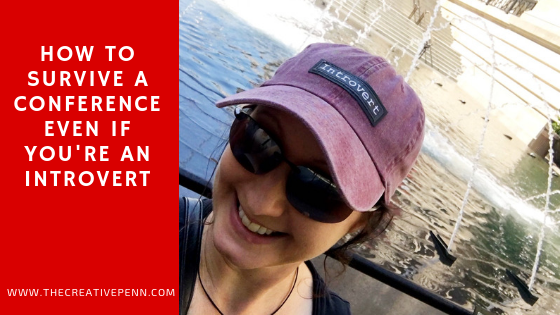Connecting with other writers and authors is a great way to battle the isolation that can sometimes come with the writing life. But what if you’re an introvert who hates crowds and gets overstimulated easily? Cat Rose shares nine tips for making the most of conferences without exhausting yourself.
 Let’s imagine your industry’s biggest conference is coming up. Three days of back-to-back presentations, workshops, and panels, with endless opportunities to network, pitch influential people and evenings spent keeping the party going…
Let’s imagine your industry’s biggest conference is coming up. Three days of back-to-back presentations, workshops, and panels, with endless opportunities to network, pitch influential people and evenings spent keeping the party going…
If you’re an introvert, this may sound about as appealing as a punch in the ribs. Unfortunately, conferences are generally not designed for the quiet-seeking, introspective and highly sensitive type.
Which happens to be a great many of us writers and creatives.
Conferences are designed for the many, not the few. If a quiet meeting over tea with a friend is pole fishing, conferences are ocean-floor scraping. They prioritize mass engagement, not one-to-one connections.
Highly sensitive introverts have it even harder. A highly sensitive person tends to feel overstimulated with bright lights, lots of noise, lots of action and before long they burn out.
If you’ve ever been to a conference and felt like you’ve been run over for days afterward, you’ll know how this feels.
If you haven’t attended a conference yet – don’t let this put you off! Regardless of your conference experience to date, I want to show you the simple strategies you can put into place that can make any conference manageable, valuable and maybe even… enjoyable.
1. Add padding. Before and after.
 By padding, I mean put time aside that doesn’t contain any energy-zapping activities. You might consider traveling to the hotel or wherever you are staying a day or two early. That way, the travel part is separate from the conference itself, and you have time to get your bearings and settle into your temporary home.
By padding, I mean put time aside that doesn’t contain any energy-zapping activities. You might consider traveling to the hotel or wherever you are staying a day or two early. That way, the travel part is separate from the conference itself, and you have time to get your bearings and settle into your temporary home.
Similarly, after the conference, put time aside in your calendar that will allow you to really process the experience and allow a much speedier recovery, if you need it.
If this is difficult to schedule, consider taking a shorter visit to the conference. If it’s three days long, stay for one or two. Don’t sacrifice the rest of your life
2. Pack your comfort items.
I don’t know what your comfort items are, but mine are: an Aeropress coffee maker (just in case the hotel’s isn’t up to scratch), earplugs (the silicone type work wonders for light sleepers) and a foldable yoga mat (especially if I’ve traveled far and need a stretch.)
Whatever you need to add a bit of home comfort while you’re away is going to make a surprising amount of difference to your overall quality of experience.
I’ve heard about people packing their own pillows for a hotel stay, because of the extra chance of a good night’s sleep a pillow makes. Have a think about your daily life, and list the little things that bring you comfort, and which of them you could travel with (sorry, usually pets aren’t allowed!).
3. Pack your comfort routine.
 In addition to physical items, have a think about your daily routine. Which parts bring you comfort? I protect my morning time with my life because I know that this is the guaranteed peace that will help me set myself up for the day.
In addition to physical items, have a think about your daily routine. Which parts bring you comfort? I protect my morning time with my life because I know that this is the guaranteed peace that will help me set myself up for the day.
I see it as my warm-up as if I was an athlete (very far stretch of the imagination.) If I drop it when I’m away from home, I usually feel rushed and stressed as I get plunged into my day.
Your routine might be as simple as sitting in your hotel room with some tea or coffee, reading before going to the conference. It might be journaling before bed or taking some time to meditate or go for a run.
Just because you’re away from home, you don’t have to be in ‘conference mode’ all day and all night. Take your routine with you.
4. Be selective.
Most conferences I see these days are attempting to pack in as many speakers and events as possible, many of them overlapping.
FOMO alert! The fear of missing out at a conference is all too real and can be quite triggering for the easily-overstimulated and over-thinking minds.
Long before you pack your bags, try to whittle down the speakers you really want to see. Ask yourself: if I just saw these people, would I feel like I made the most of my time?
You might leave room for spontaneity on the day, but ideally, you want to be in a place that lets you feel peace.
5. Prep your side dish.
Now you’re at the conference, how do you manage the first awkward moments of conversation? For the most part, introverts aren’t usually fans of small talk. We like to go deep. But side dishes allow us to start conventional and work our way into the deeper, more interesting territories – without freaking anyone out.
 Your side dish has nothing to do with food; this is how you answer a typical question like, ‘Have you been on holiday recently?’
Your side dish has nothing to do with food; this is how you answer a typical question like, ‘Have you been on holiday recently?’
Sure, you could answer this with a straightforward ‘yes’ or ‘no’, and pretty much kill the conversation there.
Instead, always have a ‘side dish’ prepared. ‘Yes – Portugal. It was beautiful – the food, in particular, was worth the trip alone!’ The side dish is your commentary on the food.
The trickier follow up when your answer must be a negative: for instance, you haven’t been on holiday. Rather than an abrupt ‘No’, which can really shut down a conversation, you could try elaborating with a positive spin: ‘Not at the moment, but I’d love to travel more. Have you been anywhere recently?’
You can make just about any ‘No’ a bit more interesting by adding (1) an opinion (ideally positive) and (2) a question, to turn it back on them.
Start preparing yourself for typical small talk questions, and a handful of side dishes (opinions, facts or questions) to tag on to your answers.
6. Go with a friend.
Ever notice how hard it is to talk about what you do, but it’s so easy to talk about what a friend or someone you admire does? The best form of marketing is still word of mouth, and having a friend there to talk you up (and you them) isn’t just less awkward, it’s also incredibly powerful.
You don’t have to come with someone you know well, you could reach out to an attendee online in advance, and get to know them. If you hit it off, you can be each other’s number one promoters.
7. Practice slow networking.
Slow networking means you don’t have to ‘work the room’ or collect business cards like it’s your job. In fact, you don’t even have to pitch anyone if you’re not feeling comfortable with it.
 Your connections can be made at the event, but you can save the business end of things for when you get home. My standard strategy at nearly any event I go to, big or small, is focussing my attention on who I’m speaking to during the event. I soak everything they say up like a sponge, and I don’t pressure myself to sell or convince them of my own offerings then and there.
Your connections can be made at the event, but you can save the business end of things for when you get home. My standard strategy at nearly any event I go to, big or small, is focussing my attention on who I’m speaking to during the event. I soak everything they say up like a sponge, and I don’t pressure myself to sell or convince them of my own offerings then and there.
It’s after the event that I make my move. And this may be an email, letting them know I enjoyed our chat and maybe asking to chat again. Other times, it might be an even slower process: just connecting on social media and putting a date in my calendar to reach out again in the future.
This is a slow, steady, low-pressure way to network, that usually works a lot better than a scattergun, high-pressure approach, regardless of whether you’re an introvert or an extrovert.
8. Or don’t network at all.
What if you just went to this conference to get some inspiration? To see your favorite author in action? There’s no reason to put a load of pressure on yourself to make something happen, especially if it could detract from your enjoyment of the experience.
9. When you’ve had enough, admit it.
Similarly, there’s no point in prolonging your experience past the line of enjoyment. If you’re feeling yourself flag after a few hours, take a time out. Or call it quits altogether.
Most of the time, an hour alone usually recharges me for another stint, but I’m a stickler for early bedtimes. The important part is remembering to check in with how you’re feeling – and to not berate yourself for tapping out before others.
As much as a hermit-like introvert I am, I can’t deny the importance of conferences when it comes to leveling up your creative career. Meeting people face-to-face is very different from dropping a comment on a blog post, or chatting on Twitter.
In my experience, no amount of online interactions come close to matching the strength of the connections made at these events. If you attend with an open mind and pay attention to your own needs and your own introverted strengths, I have no doubt you can get the same – if not more – value as an extrovert would, from your next conference
What are your favorite survival tips when attending conferences? Please leave your thoughts below and join the conversation.
 Cat Rose helps creative introverts show their work and get the exposure they deserve. She does this through the League of Creative Introverts online community, as well as one-to-one coaching and her podcast, The Creative Introvert.
Cat Rose helps creative introverts show their work and get the exposure they deserve. She does this through the League of Creative Introverts online community, as well as one-to-one coaching and her podcast, The Creative Introvert.
Her aim in life is to help all her clients do what they love and realize their dreams while honoring their personality type and preferences.
You can connect with Cat online or in person at a conference! Find out more at: TheCreativeIntrovert.com
[Airplane image courtesy Amarnath Tade and Unsplash. Portugal image courtesy Ricardo Resende and Unsplash. Sloth image courtesy Sebastian Molinares and Unsplash.]
